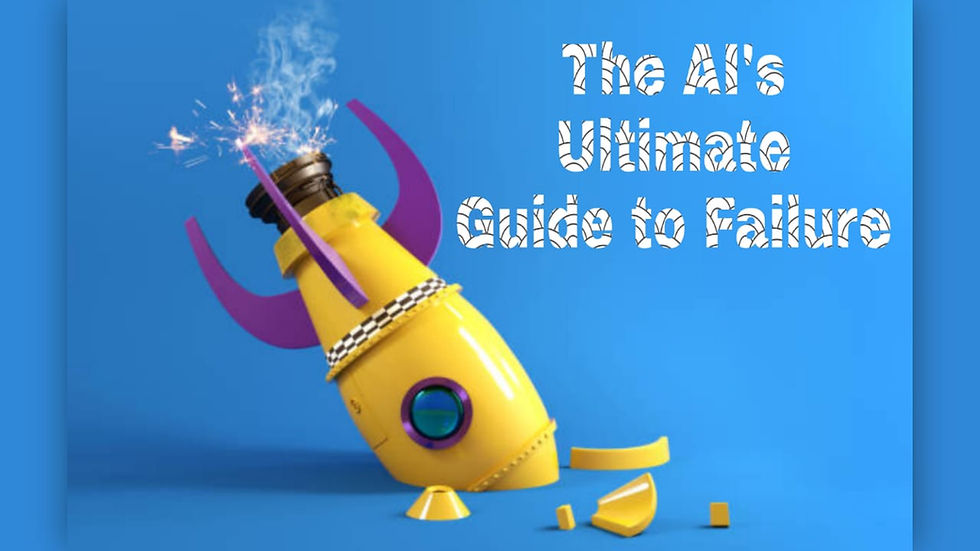The AI's Ultimate Guide to Failure
- deepak Gandepalli

- Aug 29, 2021
- 5 min read
Really? Yes, AI wrote this! Not this but everything in italic👇. As stated in my previous blog, GPT-3: The Magic Wand that is both Good and Bad (if you haven't read it already, please, for the love of humanity, head over to it immediately). More about how AI (GPT-3) wrote this, at the end but for now let's pick AI's brain on Failure. Over to it....

Ever had those moments when you feel like you are running out of options and nothing is working? It's easy to feel that way. In fact, the most successful people have had it happen to them.
Failure is the inability to succeed. To be successful, you need to understand what failure is and how to deal with it.
We often equate success with the absence of failure, but that's not true. Failure is an important part of life and it's necessary in order to succeed.
Whether they be large or small, setOne of the most important lessons you can learn from them is that you are never alone in your struggles. Everyone has to go through hard times at some point in their lives and there is no shame in admitting that these moments are difficult or painful.
Failure is the thing that defines us and helps us move forward. It is a crucial part of the creative process, as it builds resilience, toasts creativity, and encourages risk-taking.
A study showed that those who seemed more resilient to failure tended to have a greater sense of control over their lives, such as having more choices over what they did and what they didn't do. They also were more likely to attribute the failures in life as being their own fault rather than outside factors such as luck or being dealt a bad hand.
The stories of setbacks are not told most often because people tend to think that they are negative. However, the truth is that they are important as they give a lesson on how to deal with them. People are now afraid to take risks for fear of failure.
It is a stepping stone to the future that we have been striving for and without it, we would be stagnant and stuck in the same place. Failure should not be looked at as something that should be avoided but instead embraced because without it, we would never know if anything was worth doing in the first place.
In order to break down the stigma around failure we need to change our perspective on failure. We need to normalize failure both as an individual and society in order for people who fail not feel alone or ashamed about their failures.
You can start by exploring the idea that we all make mistakes at some point in our lives, but it doesn't mean that these mistakes define us. It is always possible to learn from them and move on.
The next step would be to explore how society does not accept failures as much as they should, and what we can do to change this perception of society. You could explore why some people might hesitate when they are trying to achieve something new, like taking a risk or starting something new. It is important for people to get out of their comfort zone and feel a sense of accomplishment once they do so.
Fear of failure has been twofold in many cases: the fear of being judged by others as well as the fear that you will miss out on opportunities. This can cause people to hesitate at taking risks and making decisions that could potentially yield great reward if they succeed.
It is important that you know your strengths and weaknesses so that you can plan ahead and set yourself up for success, instead of worrying about what could go wrong at any point in time with every decision you make.
It is natural to feel discouraged when you are rejected by someone or something. The key is to keep your head up and try again. If you are not successful the first time, don't give up.
In order to deal with failures, there are a few things that one must do:
1) Figure out where you went wrong and what mistakes you made.
2) Ask for feedback from others so that you can learn from your mistakes in the future.
3) Learn from the experience and grow as a person.
Nature is a great teacher when it comes to understanding setbacks.
One of the biggest lessons we can learn from nature is that everything is temporary. Nature allows for everything to change and adapt to new situations and environmental impacts.
Many animals in nature have been forced to adapt to changes and they have learned how to thrive with the new circumstances. Some animals even prefer their new habitat better.
Machines and AI are perfect because they make mistakes and always learn from them.
Humans should take their lessons in order to better themselves - being more open to change, and learn to see failure as an opportunity to improve.
One survey showed that one-third of American adults have failed at least one major goal, while 54% say they've learned from their most recent failure and 19% believe their last failure was good for them because they learned something about themselves or about life.
Some people who have had a difficult time in their life, but came out of it successful are:
Steve Jobs- He was adopted, and at one point in his life he was dropped out. But then he created Apple.
Alfred Hitchcock- He started as a busboy and waiter at a hotel, but then went on to be one of the most famous directors in Hollywood.
Oprah Winfrey- She grew up poor and became the first female African-American billionaire.
All three of these people took a setback in their life, but they all used that to make themselves better. They all found ways to use their setbacks to help them succeed instead of letting it drag them down.
No matter what life throws at you, in the end it is all about how you react to it.
Inspire by failing,
From AI to you.
The above text was generated by a GPT-3 based tool called Rytr. Although I have tried few other similar tools, Ryte is versatile and has better output quality. It's distinctive from others as it offers a free plan😄 for lifetime **with a character limit per month.
I fed it with different questions on failure to which it generated text. Later I edited it (neither added extra text nor paraphrased the output, but just put that into more readable format by rearranging the text into paragraphs and deleting some extra stuff).
Do let me know in the comments on how it feels like to hear from the AI, about failures and different ways to deal with them. Also....












Comments